A reliable car battery is essential for the smooth operation of your vehicle, and it’s often taken for granted until it fails unexpectedly. To avoid being stranded with a dead battery, it’s crucial to recognize the signs of a failing battery in your car. In this comprehensive article, we will explore the common indicators that your car battery may be nearing the end of its life.
-
Slow Cranking a Common Sign of a Failing Battery

One of the most common signs of a failing car battery is slow cranking. When you turn the key to start your car, and the engine cranks slowly, it’s a telltale sign that your battery might be on its last legs. This slow cranking occurs because the battery is no longer capable of providing the necessary electrical power to turn the engine over. If you notice that your engine struggles to start or hesitates before turning over, it’s time to consider a battery replacement.
-
Dimming Headlights and Interior Lights

Another noticeable sign of a failing battery is dimming headlights and interior lights. A healthy battery provides a consistent flow of electrical power to all the vehicle’s components, including the lights. If you notice that your lights are noticeably less bright than usual, especially when you rev the engine, the battery could be losing its charge capacity. This dimming can be more pronounced when you turn on other electrical components like the air conditioner or the heater.
-
Warning Lights on the Dashboard
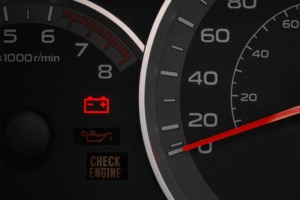
Modern vehicles are equipped with sophisticated systems that monitor various components, including the battery. If the battery is struggling, it might trigger warning lights on your dashboard. Keep an eye out for the battery or check engine light, as well as other warnings related to electrical systems. These warning lights serve as a clear signal that something is amiss with your vehicle’s electrical system, and a battery check is in order.
-
Electrical System Issues
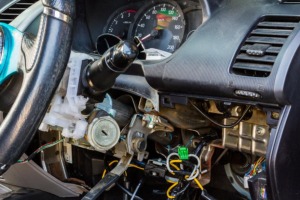
A failing battery can affect various electrical components in your car. You may experience issues with power windows, power seats, or the radio. If your accessories seem to be malfunctioning or operating erratically, a failing battery could be the culprit. This happens because the battery can no longer provide a consistent supply of power to these systems, leading to performance issues.
-
Unusual Odor
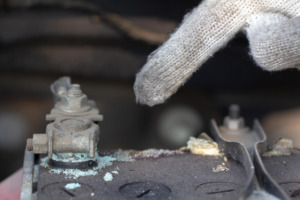
Sometimes, a failing battery can emit a distinct, unpleasant odor. If you detect a sulfurous or rotten egg-like smell coming from your engine bay, it’s a sign of a leaking or overcharging battery. In such cases, it’s crucial to address the issue promptly, as it could be dangerous. The odor is caused by sulfuric acid escaping from the battery, which is both corrosive and harmful. It’s important to consult a professional immediately if you notice this smell.
-
Old Age
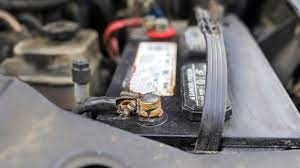
Car batteries typically have a lifespan of about 3-5 years, depending on the type and usage. If your battery is reaching the end of its expected lifespan, it’s wise to start considering a replacement, even if you haven’t experienced any of the other symptoms mentioned above. While some batteries can last longer, especially if they are well-maintained and the vehicle is not exposed to extreme conditions, it’s a good rule of thumb to start thinking about a replacement once your battery approaches the five-year mark.
-
Difficulty Starting in Cold Weather

Cold temperatures can put additional strain on your battery, making it more challenging to start your vehicle. If you find that your car has trouble starting in cold weather, it’s a clear sign that your battery’s performance is compromised. Cold weather reduces the chemical reactions within the battery, making it more difficult for it to provide the necessary power. If your battery is already weak, it may not have enough power to start the engine in cold conditions.
-
Corroded or Swollen Battery Case
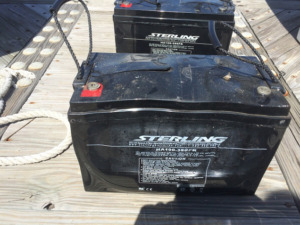
Visually inspect your battery for any signs of corrosion or swelling. Corrosion on the battery terminals can hinder electrical flow, while a swollen battery case indicates an internal issue. Both of these can lead to battery failure. Battery terminal corrosion occurs when the battery acid escapes and interacts with the metal terminals, creating a layer of corrosive material that disrupts the flow of electricity. A swollen battery case can indicate a more serious problem, such as an internal short circuit, and should be addressed immediately.
-
Frequent Jump-Starting
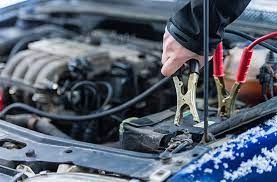
If you find yourself frequently jump-starting your vehicle, it’s a strong indicator that your battery is struggling. While occasional jump-starts can be due to other issues, frequent ones are likely related to a failing battery. Jump-starting temporarily boosts your battery’s power, allowing you to start the car. However, it does not fix the underlying issue. If your battery requires jump-starts often, it’s a clear sign that a replacement is in order.
-
Unusual Sounds

Some failing batteries may emit a clicking or buzzing sound when you attempt to start the car. This noise is caused by the solenoid trying to engage the starter, but the battery doesn’t provide enough power for a smooth start. The clicking sound is a result of the starter motor not receiving a consistent flow of electricity. It’s essential to address this issue promptly, as continued attempts to start the car in this condition can further drain the battery and potentially damage the starter.
Being aware of the signs of a failing battery can save you from unexpected breakdowns and costly towing services. If you notice any of the mentioned indicators, it’s advisable to have your battery inspected by a professional mechanic. Timely battery replacement can help ensure your car starts reliably and keeps you on the road without any interruptions. By paying attention to these signs, you can extend the life of your battery and ensure a trouble-free driving experience. Don’t wait until you’re stranded with a dead battery; take proactive steps to address the issue and keep your vehicle running smoothly.
